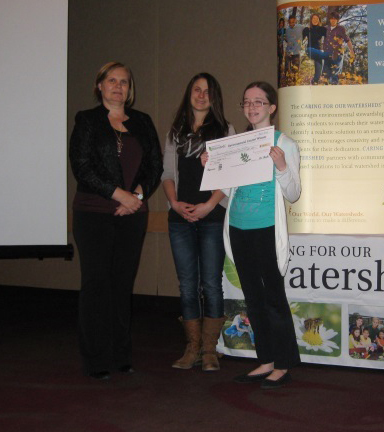2014 Saskatoon, Saskatchewan, Canada

Maggie Reid from Greystone Heights School in Saskatoon, Saskatchewan, proposed the idea of putting up posters at her local neighbourhood grocery stores and pharmacies to inform and educate Saskatonians on the proper way and appropriate locations to dispose of pharmaceutical products. In her proposal, Maggie made the connection that when you turn on the tap and fill your glass with water, that water may still have traces of medications and pharmaceuticals in it.
In Maggie’s research she found that although waste water treatment plants can remove many chemicals and foreign materials, active drug compounds are not eliminated and can collect in our rivers, lakes and ground water. When these chemicals collect in water bodies they have the potential to impact the fish, wildlife, and other organisms living within aquatic ecosystems. Expired or unused pharmaceuticals have certain chemical properties that may disrupt the proper function of hormone systems and can be attributed to causing fish to change sexes from male to female during sensitive stages of development. This has consequences for breeding and maintaining healthy fish populations in our rivers and lakes. Not to mention, we drink this water ourselves! This was a problem that Maggie felt strongly about.
She discovered that people still currently flush un-used medications or pharmaceuticals down the toilet in order to keep their children or pets from ingesting them. Maggie felt the solution to this problem was to raise awareness. If people knew that the South Saskatchewan River that they loved was becoming increasingly filled with chemicals from the improper disposal of pharmaceuticals, they would think twice the next time they went to flush their pills down the toilet! She discovered that there was an easy alternative available for the safe disposal of these items. All peopled needed to do was return expired and unused pharmaceuticals to their local pharmacy where there are policies to safely dispose of them. Maggie took action to implement her project and received permission to put up posters at Extra Foods’ pharmacies and the Coop pharmacies within her neighbourhood. The posters communicated information in a fun and simple way through graphics that Maggie drew by hand. The participating pharmacies were delighted to put up Maggie’s posters and were happy that she was taking the initiative to improve her watershed through the Caring for our Watersheds program!
